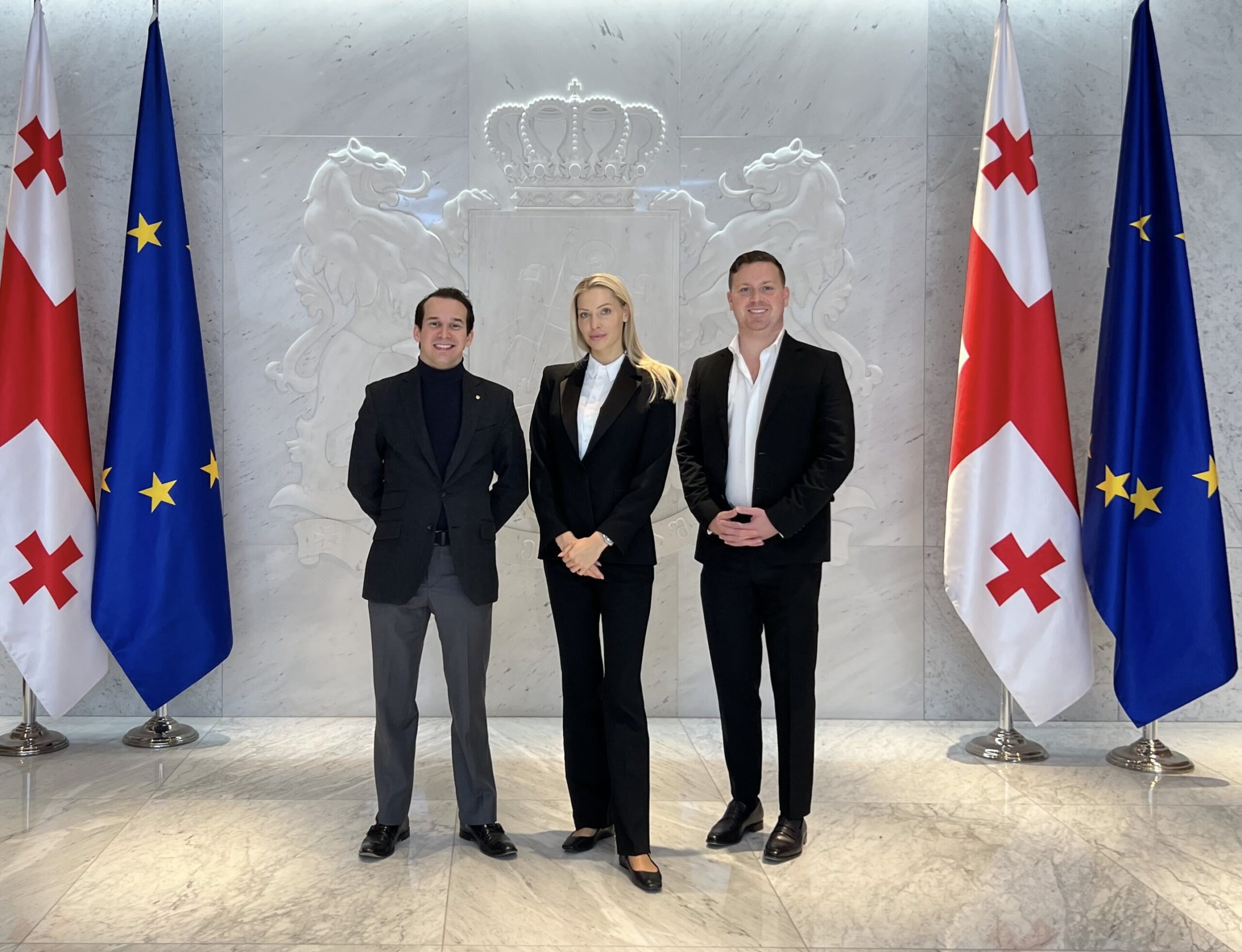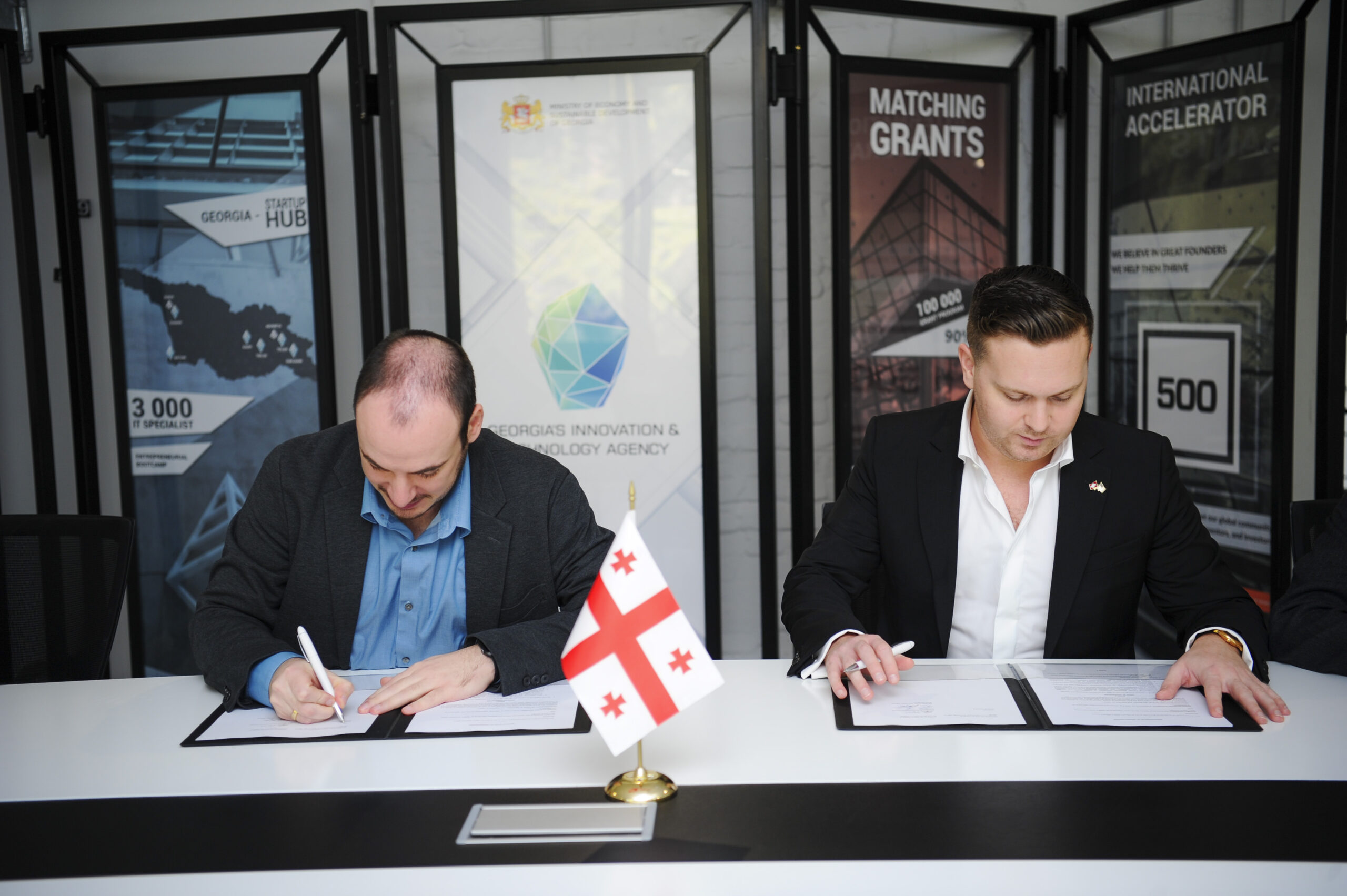
Last week, the Partisia Blockchain team journeyed to Georgia, a land rich in cultural heritage as the birthplace of wine and now at the forefront of blockchain innovation. Here is a short recap of our fruitful trip.
Last Thursday marked a milestone as Partisia Blockchain formalized its collaboration with the Georgian Innovation and Technology Agency (GITA) through the signing of a Memorandum of Understanding (MoU). This pivotal agreement with GITA under the Ministry of Economy and Sustainable Development sets the stage for collaborative efforts aimed at driving advancements in Web3 technology, both within Georgia and the wider Caucasus. By leveraging their combined expertise and resources, Partisia Blockchain and GITA will explore innovative solutions and applications of blockchain technology, fostering joint support for innovative projects, educational initiatives and frameworks for implementation. This collaboration signifies a commitment to shaping the digital transformation landscape, contributing to economic growth, innovation and societal development in Georgia and beyond.

Our team had the pleasure of meeting with members of the Georgian Web 3.0 community, where we showcased the transformative potential of Partisia Blockchain and multiparty computation (MPC) technology, our latest MOCCA solution and a range of other advantages of MPC. Additionally, we introduced our Grants Program aimed at fostering innovation in the Caucasus. In Tbilisi, we were treated to an exclusive demo of the Nova Miningverse video game, a tangible showcase of Partisia Blockchain’s capabilities. This was followed by an informal meeting with the team behind the game.
Last Friday began with a meeting with Razhden Kuprashvili, Head of the Georgian Anti-Corruption Bureau and his team at the Administration of the Government of Georgia. We discussed the potential of MPC and blockchain technology in combating corruption. Later, we exchanged ideas with entrepreneur Vako Turnava at the offices of his companies Sweeft and Skillwill. Conversations revolved around the various applications of MPC and privacy-enhancing technologies, emphasizing the importance of education and training.
This trip showcased the possibilities of blockchain technology and strengthened our commitment to driving positive change in Georgia and beyond. Stay tuned for updates as we continue to push the boundaries of innovation and collaboration in the world of Web 3.0.
Stay updated: Website • X • Discord • Telegram • LinkedIn • Facebook • Instagram • GitLab • Medium • YouTube
TBILISI, 8 FEBRUARY 2024. Today, Partisia Blockchain, a leader in privacy-preserving, interoperable and sustainable blockchain solutions, achieved a significant milestone in advancing innovation by solidifying ties with Georgia’s Innovation and Technology Agency (GITA) under the Ministry of Economy and Sustainable Development. The signing of a Memorandum of Understanding in Tbilisi marks a pivotal moment in the ongoing efforts to promote innovation using multiparty computation (MPC) and blockchain technologies in Georgia.
The ceremony in the Caucasus nation’s capital follows the successful launch of Partisia Blockchain’s MPC On-Chain Custody Advanced solution (MOCCA) and discussions during the World Economic Forum in Davos about future endeavors with potential partners.
The signing ceremony in Tbilisi drew national state officials, Georgian blockchain industry players, students, Tbilisian press corps and the Partisia Blockchain delegation.

Brian Gallagher, Co-Founder of Partisia Blockchain, says:
“Today’s signing with GITA goes beyond paperwork. It signifies our commitment to driving innovation in Georgia and beyond. Our combined expertise in MPC and blockchain will bring new secure, transparent and decentralized solutions. This initiative exemplifies the power of combining expertise from the public and private sectors. Together, we will shape the future of blockchain technology, ensuring its responsible and widespread adoption.”
In this groundbreaking initiative, GITA and Partisia Blockchain are set to fuel innovation by working closely. GITA will provide crucial support for Partisia Blockchain’s involvement in Georgian blockchain and Web3 ecosystem. Simultaneously, Partisia Blockchain will lend its expertise to assess and contribute to projects in GITA programs, extending grants and technical support where needed.
Ensuring seamless communication, GITA will act as a bridge, fostering dialogue between Partisia Blockchain and various stakeholders, including the Georgian public and private sectors and academia.
Education is a cornerstone of this understanding. Partisia Blockchain will play a key role in shaping the minds of participants in GITA’s educational programs, contributing insights on MPC, homomorphic encryption and their integration with blockchain technology. This commitment to education reflects the shared vision of advancing technology while ensuring knowledge and understanding pave the way for a sustainable future.
Avtandil Kasradze, Chairperson of Georgia’s Innovation and Technology Agency, emphasized the significance of the understanding:
“GITA is excited to join forces with Partisia Blockchain. This understanding aligns with our mission to integrate cutting-edge technologies into various economic sectors, fostering innovation and ensuring a competitive edge for Georgia. By collaborating with industry leaders like Partisia Blockchain, GITA aims to propel Georgia to the forefront of technological innovation. We look forward to a fruitful understanding that will benefit our nation and the global technology community.”
Partisia Blockchain is committed to playing an active role in GITA’s initiatives, contributing meaningfully to the local and global blockchain conversation.
About Partisia Blockchain: Partisia Blockchain brings unparalleled opportunities by empowering privacy-preserving, interoperable and sustainable innovation for fairness and transparency. It fuels the most secure and efficient networks to solve global problems. Distilled with 35 years of rigorous research, Partisia Blockchain future-proofs solutions, solves tomorrow’s challenges by powering fair, secure, distribution of benefits. While preserving privacy and confidentiality, it brings accountable, transparent and decentralized governance. Learn more: www.PartisiaBlockchain.com
About Georgia’s Innovation and Technology Agency (GITA): Georgia’s Innovation and Technology Agency (GITA) under the Ministry of Economy and Sustainable Development is dedicated to fostering innovation and technology. By prioritizing infrastructure development, opening technoparks and innovation centers, GITA aims to integrate cutting-edge technologies into all economic sectors. The state Agency focuses on increasing investment capital, engaging private businesses and enhancing research through effective processes. GITA’s commitment extends to widespread internet access, quality training, and incentives to drive innovation and technology development, ensuring a competitive edge. Learn more: www.gita.gov.ge
Stay updated: Website • X • Discord • Telegram • LinkedIn • Facebook • Instagram • GitLab • Medium • YouTube
Introducing Partisia Blockchain’s highly anticipated AirDrop program. We are thrilled to launch the Partisia Blockchain AirDrop program. It marks a significant milestone for ecosystem adoption. With the upcoming governance vote for the MPC token transferability just around the corner, this is a testament for the Partisia Blockchain’s vision. The program features an impressive pool size of 25 million MPC tokens. The program offers an unparalleled opportunity for the early adopters of the Partisia Blockchain.
The first tranche of the 25 million MPC token AirDrop program will kickstart the further expansion of our ecosystem.
As we prepare for the MPC token listing – outlined in the December 2023 update – this AirDrop program is designed to invigorate the ecosystem. For the début AirDrop tranche, we value continuous activity and contributions within the ecosystem. Detailed participation information is available on the official AirDrop program webpage.
In the last 12 months, the Partisia Blockchain ecosystem has rapidly grown. It attracts builders and innovators from various industries, and this is your chance to be rewarded for participating in the official launch. Innovators, such as MetaNames, are offering decentralized domain name services are prime examples. The deployment of these dApps to mainnet is a crucial step in fostering growth and creating a synergistic ecosystem. They empower and bring to life collaborations between dApps and broadening the scope of new use cases. As the AirDrop program takes place, more dApps will deploy on mainnet to chart an exciting AirDrop journey. We encourage participants to deploy their own contracts with the smart contract IDE, DApp playground.
Stay updated: Website • X • Discord • Telegram • LinkedIn • Facebook • Instagram • GitLab • Medium • YouTube